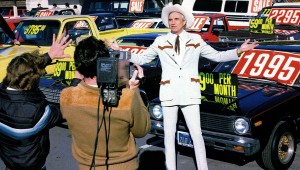Why are car dealer commercials so crappy? I’m not talking about the manufacturers’ ads. Those cost millions and have big-name professional spokespeople. The regional marketing association ads aren’t quite as flashy, but Ford Truck Month or End of Year sales for the Area Chevy Dealers are at least competent depictions of the product.
 I’m talking about local dealer ads. They all come from the same mold. Element 1:The owner or manager squinting into the sun in front of a lot full of cars. Element 2: A claim of “We are the biggest” or “We have the lowest prices.” or both. Element 3: Lousy production values — lock-down static shots and whatever the on-camera guy wore that day.
I’m talking about local dealer ads. They all come from the same mold. Element 1:The owner or manager squinting into the sun in front of a lot full of cars. Element 2: A claim of “We are the biggest” or “We have the lowest prices.” or both. Element 3: Lousy production values — lock-down static shots and whatever the on-camera guy wore that day.
This week I had the chance to watch a couple videos of pitches by tech startups to investors. These weren’t rank amateurs. At the very least they had beaten out a few thousand applicants just to be in the room. They had worked for months with mentors to hone in their business models and refine their presentations. Some had several successful tech startups to their credit already.
 Yet they still looked like amateurs. They were uniformly in T-shirts or unpressed sport shirts worn untucked. Their presentations were often too technical for even their experienced audience, and they frequently mumbled long strings of acronyms. Yet they were hoping to, and many did, walk away with commitments for millions or dollars.
Yet they still looked like amateurs. They were uniformly in T-shirts or unpressed sport shirts worn untucked. Their presentations were often too technical for even their experienced audience, and they frequently mumbled long strings of acronyms. Yet they were hoping to, and many did, walk away with commitments for millions or dollars.
Clearly, both groups are doing it intentionally. I searched the literature on car dealer commercials, and the industry publications claim it is a cost savings measure. That’s a crock. Maybe a small town dealer is knocking out cheap commercials, but the billionaire owners (yes, billionaires) with scores of stores and multi-million dollar ad budgets do the exact same thing.
The objective is to gain the trust of the customer by saying “I’m just like you. I am a normal guy trying to make a living. This is the real me. You can trust me because I clearly don’t even make enough profit on my cars to even produce a decent commercial.”
The tech hopefuls are doing the same thing. I jokingly asked one of the mentors what would happen if a start-up CEO came on stage with his shirt tucked in. He said “Oh, they would throw him out immediately.” Tech industry investment is driven by stereotypes and legends. The next tech billionaire is working in a garage, dorm room or loft somewhere, just like the founders of Hewlett Packard, Dell or Facebook. He (or rarely, she) is too busy being a genius to bother with suits.
Both the auto dealers and the tech start-ups are practicing the same marketing technique. They establish trust with their buyers by doing what is expected. By starting out with the accepted stereotype, they don’t waste precious minutes either on the air or on the stage explaining why they look different.
What do your customers expect from you? Many small businesses try to differentiate by saying “We aren’t what you expect. We don’t look or behave like our competitors.” In most cases, they then have to waste time explaining why.
Take an objective look at your marketing. You might be better off, and establish trust more quickly with your prospects, by simply doing what everyone else does.

3 Responses to Marketing for Trust